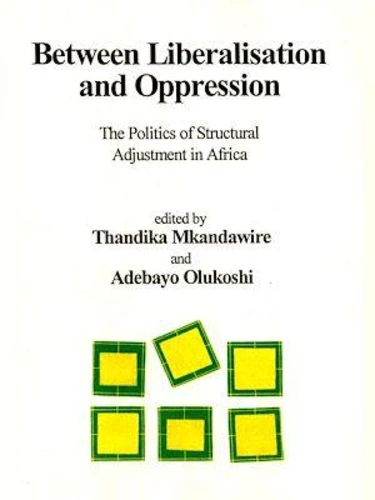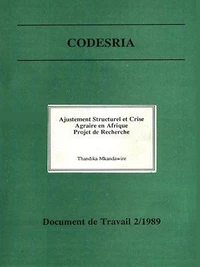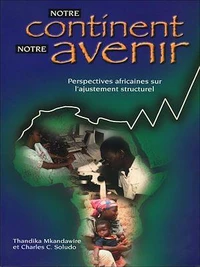Between liberalisation and oppression. The politics of structural adjustment in Africa
Par : ,Formats :
Disponible dans votre compte client Decitre ou Furet du Nord dès validation de votre commande. Le format ePub est :
- Compatible avec une lecture sur My Vivlio (smartphone, tablette, ordinateur)
- Compatible avec une lecture sur liseuses Vivlio
- Pour les liseuses autres que Vivlio, vous devez utiliser le logiciel Adobe Digital Edition. Non compatible avec la lecture sur les liseuses Kindle, Remarkable et Sony
 , qui est-ce ?
, qui est-ce ?Notre partenaire de plateforme de lecture numérique où vous retrouverez l'ensemble de vos ebooks gratuitement
Pour en savoir plus sur nos ebooks, consultez notre aide en ligne ici
- Nombre de pages498
- FormatePub
- ISBN978-2-38234-009-7
- EAN9782382340097
- Date de parution01/12/2020
- Protection num.Digital Watermarking
- Taille758 Ko
- Infos supplémentairesepub
- ÉditeurCoédition NENA/CODESRIA
Résumé
No one can fail to be aware of the incredible impact that the IMF and the World Bank have had on Africa. Their structural adjustment programmes were deliberately designed to shock African economies into free market reform and ensuing stability. But when « getting the prices right » first swamped the World Bank's African economic plans in the early 1980s, few bothered to analyse the politics of a reform package whose immediate impact was violent and unsettling.
While Africa has come a long way since then, the goal of market reform must be as important as the task of understanding the politics of unleashing the forces of the market. Not least, is the question of democratisation, which the Bank itself now attempts to force through with loan conditions. This book is the culmination of intense debate by African authors across the continent. Three sections make up a comprehensive analysis of adjustment regimes, their perspectives and the political context in which they have survived, or not.
Country case studies in both Anglophone and Francophone Africa round up the analysis.
While Africa has come a long way since then, the goal of market reform must be as important as the task of understanding the politics of unleashing the forces of the market. Not least, is the question of democratisation, which the Bank itself now attempts to force through with loan conditions. This book is the culmination of intense debate by African authors across the continent. Three sections make up a comprehensive analysis of adjustment regimes, their perspectives and the political context in which they have survived, or not.
Country case studies in both Anglophone and Francophone Africa round up the analysis.
No one can fail to be aware of the incredible impact that the IMF and the World Bank have had on Africa. Their structural adjustment programmes were deliberately designed to shock African economies into free market reform and ensuing stability. But when « getting the prices right » first swamped the World Bank's African economic plans in the early 1980s, few bothered to analyse the politics of a reform package whose immediate impact was violent and unsettling.
While Africa has come a long way since then, the goal of market reform must be as important as the task of understanding the politics of unleashing the forces of the market. Not least, is the question of democratisation, which the Bank itself now attempts to force through with loan conditions. This book is the culmination of intense debate by African authors across the continent. Three sections make up a comprehensive analysis of adjustment regimes, their perspectives and the political context in which they have survived, or not.
Country case studies in both Anglophone and Francophone Africa round up the analysis.
While Africa has come a long way since then, the goal of market reform must be as important as the task of understanding the politics of unleashing the forces of the market. Not least, is the question of democratisation, which the Bank itself now attempts to force through with loan conditions. This book is the culmination of intense debate by African authors across the continent. Three sections make up a comprehensive analysis of adjustment regimes, their perspectives and the political context in which they have survived, or not.
Country case studies in both Anglophone and Francophone Africa round up the analysis.





